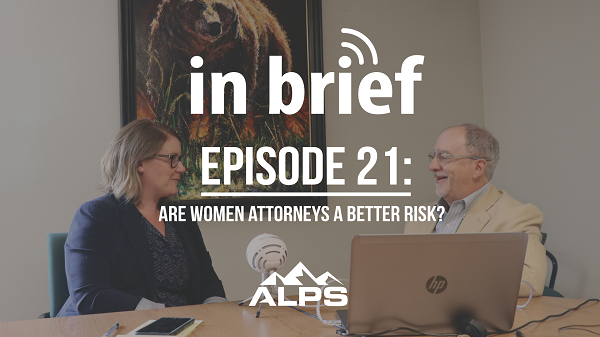6 min read
ALPS In Brief Podcast-Episode 1: A Cyber Breach - It’s Not If, It’s When.
ALPS In Brief, The ALPS Risk Management Podcast, is hosted by ALPS Risk Manager, Mark Bassingthwaighte. While in Missoula, Libby Benet, U.S. Lead...
We've crafted solutions tailored to your firm
The world of insurance for law firms can be confusing, and difficult to navigate. We've created this glossary because these common insurance terms should be easy to understand.
8 min read
 Mark Bassingthwaighte, Risk Manager
:
Updated on February 28, 2025 | Posted on August 30, 2018
Mark Bassingthwaighte, Risk Manager
:
Updated on February 28, 2025 | Posted on August 30, 2018

In this episode of the ALPS In Brief podcast, ALPS Risk Manager Mark Bassingthwaighte sits down with ALPS Underwriting Manager Leah Gooley to dig a little deeper into ALPS 30+ years of claims experience and what our data is telling us about women attorneys and their lower propensity toward malpractice claims.
ALPS In Brief, The ALPS Risk Management Podcast, is hosted by ALPS Risk Manager, Mark Bassingthwaighte.
Transcript:
MARK:
Hello. This is Mark Bassingthwaighte, the Risk Manager with ALPS. Welcome to the latest episode of the ALPS podcast, ALPS In Brief, the podcast that comes to you from our home office in the Florence Building in beautiful downtown Missoula, Montana.
I’m delighted to have as our guest today, Leah Gooley. She is the Underwriting Manager here at ALPS. And Leah, before we get into the topic du jour, if you will, could we take just a few moments and have you share a little bit about yourself?
LEAH:
Absolutely. Thanks for having me here today. Again, this is Leah Gooley, and I am the Underwriting Manager at ALPS. I did grow up here in Montana. I actually am a native of Missoula, and I went away for school here in the neighborhood in Spokane at Gonzaga University, so go Zags, and then returned home here specifically to help with family after that, graduating with my bachelor’s.
At the time, my grandma was showing signs of dementia, and my mother was disabled, so I needed to step in there, and ended up staying in the area and really starting my career in insurance here as well, so.
MARK:
Well, very good. Very good. Leah, my interest in having you join us today … You know, here at ALPS, we are obviously getting email and things are going on in terms of what everybody’s up to and all of that, and I noticed that you were out of the office giving a presentation on: Are Women Attorneys a Better Risk. I can’t remember if that’s the exact title of your presentation, but that caught my attention. And I’d really just like to talk about that subject with you a little bit, if we may.
I guess … Are women a better risk?
LEAH:
Oh, I’m so glad you asked. They are, and it’s interesting, because not just 1% better or 5% better, but a full almost 20% better risk, according to our data. So that’s just leaps and bounds better than their male counterparts. We can talk a little bit more about this in a few minutes. But essentially, in boiling down our data, we took out all the different factors. It can be incredibly complex to come up with this kind of information, but really boiled it down to male versus women, and it’s really, really accurate that that’s the spread.
MARK:
Okay. So this is how we got here, in terms of just doing this internal study.
LEAH:
Yeah. Really the best way to look at that is to give a little bit of history on ALPS. We actually formed 30 years ago this year. The reason we formed was as an answer basically to, Montana attorneys had trouble finding affordable coverage, and liability coverage at all in some cases.
MARK:
Yes.
LEAH:
So that gave us a unique advantage, because really from the very beginning, ALPS was underwriting on an individual attorney basis, meaning that we collected individual attorney information. A lot of companies, our competitors, will use the big picture, firm as a whole.
MARK:
Right.
LEAH:
But we drill down to individual. So that also told us male versus female on those individual attorneys, and in reviewing all of that data, we found this interesting piece out.
MARK:
Yeah. Yeah. Obviously I’m well aware that we’ve been underwriting this way in terms of individual attorney specific ratings and these kinds of things. But I’m fascinated by this outcome. To be honest, I don’t know … I think I would have thought we’d see a little bit of a difference, but 20% is pretty significant. And when we say, “Okay. Now we have 30 years worth of data here,” it makes me wonder, and I suspect the answer’s probably a yes, if this is a real outcome.
And what I mean by this is that the risk preference that we’re seeing here would be playing out in data all over the country, if they bothered to track it. I don’t think this is just a unique outcome based on ALPS’s data set. Wow. Fascinating stuff.
Do you have any thoughts on why the outcome? Why do you think women are better risks?
LEAH:
Well, yeah. Right now, we don’t really fully understand the why behind that data, and I think you nailed it on the head there saying that a lot of other industries, if they are tracking it and they are looking at that data, can actually see a difference in male versus female. One of the best examples is probably auto insurance. At this point, we can look at male and female drivers and as those relate to frequency of claims, meaning how often they occur, and the severity of those claims, which is the general total value.
MARK:
Yes.
LEAH:
So women just tend to report more claims, so they have a higher frequency. But the overall cost is lower. Whereas men are often involved in more serious and severe claims, especially the IIHS, the Insurance Institute for Highway Safety. They’re the folks that noted that men, more so than women, die each year in highway crashes, and they attributed that to just risky driving practices and not using seat belts, driving while impaired, speeding, that kind of thing.
So when we look at our data, perhaps women in law are engaged in fewer risky behaviors, or those actions that can really increase a claim and the total cost of it as well.
MARK:
Yeah. Right. Right. I want to come back to that risk thing in just a moment. I want to back up in terms of just the data. Were we expecting this outcome? Were we looking for this, or this is just, we’re kind of mining our data to see what intellectual capital can be pulled from that?
LEAH:
That’s exactly right. We weren’t specifically looking for any outcome. We just wanted to see what all this information held, because again, we had so much of it. 30 years and lots of detail. Exactly. We found out this and a lot of other interesting information.
MARK:
I’ll bet. You know, I’m a little bit of a numbers guy in a sense. I just think this kind of stuff is fascinating, and wow. Wow.
Getting back now to your comment on risk, I’ve been in the risk management side of things here at ALPS for over 20 years now and have done tremendous amount of consulting. Been in over 1200 firms over the past 20 years. And some of the firms that I’ve been in have actually been 100% women in terms of the partners, just by choice, by design, just a practice of all women. When you look at, even in firms that have … they’re just normal mixes of folks of all shapes, sizes, colors and whatnot, my sense is that women seem to be better listeners. I think they seem to be more … I don’t know. I’m struggling with the word, but in terms of relationship oriented, perhaps or relationship driven. Do you think that might be in part what plays into this risk?
You know, we are about evaluating risk and I’m trying to get to, what do you think the traits are as we further explore this why. You know, we can have data that says women are a better risk, but do you have thoughts on what gets them there?
LEAH:
Again, kind of pulling from other lines of insurance, it’s been a long studied fact that doctors … They’re in a similar situation when it comes to malpractice claims.
MARK:
Of course. Yeah.
LEAH:
One of the things that always comes up is bedside manner and the ability for that kind of interaction with the patient, and the way that those two play against each other can impact if a claim is reported, whether or not there was a lapse in medical judgment. So looking at that, again, from our … Women attorneys perhaps are more collaborative in the way that they practice law and the way that they resolve those potential claims successfully. And I think that that probably plays a big part in, as you noted, just the general firm and how they approach the way they practice.
MARK:
And thank you for saying it that way. That’s really the word I was looking for, collaborative. And I do think that that makes a lot of sense to me. That’s interesting.
You know, I, in recent weeks, have been doing some reading. I’m always reading in journals all kinds of things for article ideas and just trying to stay up on what’s happening in the practice. There’s been a lot of discussion of late in law about the reality that if you look at the numbers of men and women entering law school, we’re pretty much this 50, 50 thing. But as you start to look at, how do those percentages play out over the course of a career, women are leaving the practice of law much younger and much faster than men are, and that is a bit of a concern.
One of the things that I want to say, and I’m curious if you have any thoughts on this, but when I think about the challenges that women face, and then they step away from law for whatever reasons. You know, it may be family. It may be burn out, because … I don’t know. Some firms just still don’t seem to prioritize pushing women up the ladder of sort of the power structure at the firm, and these kinds of things, as much as they do with men, and that seems to be changing, but it’s slow.
But my thought is, when women are leaving practice, and sometimes you have a family, I like the fact that … Knowing this kind of data, I guess I want to say to women, “Look. If and when you want to return to the practice, please hear and understand that from at least an insurance company like ALPS, you are a great risk.” And I want this to sort of … My hope is that this is some kind of a reason to either stay in, to go solo, to come back into practice. Do you see where I’m going? I just think this is information that it’s vitally important … I don’t know if you have thoughts about that.
LEAH:
Absolutely. Like you said, we know women are a better risk and we know that they provide a lot of value to the legal profession, and so-
MARK:
Yes.
LEAH:
One of the things that ALPS as a company in general wants to understand, what some of the challenges and the obstacles are. We do currently have a survey open right now that asks those questions, where we want to know what women face as they practice law. Women are going to keep growing within this profession. Right now I think, the last time I looked at the Department of Labor’s stats, 47% of the workforce was female, and now just slightly behind that, 36% of the legal profession is female, which is amazing, because 30 years ago, 40 years ago, it was only 1 in 10 women. So we know women are here to stay, and they’re a growing part of that value that law firms have.
MARK:
Yeah. Yeah. And again, getting back to the risk side of this, we now have data that … I’d like to take this data, if I’m a young associate or bucking to be partner in a small firm or something, as a woman I’d say, “Look. Here’s some data I just learned from ALPS. I’m a better risk. You ought to promote me.” If we’re going to give a little fuel here to some folks, that’d be awesome. But, okay.
Leah, I really appreciate your taking the time. I don’t know that I have other thoughts in this. Are there any last closing thoughts you have to share?
LEAH:
Only that we hopefully can put the link to the survey in the podcast notes, so if folks are interested in providing their thoughts, that would be wonderful. We’d love to hear more from you.
MARK:
Okay. Yes.
LEAH:
And just recognizing that women are an important part of the law profession. That’s what matters to me, so.
MARK:
Well, it matters to all of us. Well, Leah, thank you. It has been really a pleasure to speak with you today. Of course, next time I get over to the Missoula office, we’ll get a chance to visit, maybe go grab a cup of coffee and talk shop, and I really want to hear more about the kinds of crazy things you’re finding as we dig down into this data of 30 years.
To those of you listening in on the podcast, I hope you found something of value. And please don’t hesitate to check in with me anytime, if you have a speaker you’d like to hear from, if you have a topic you think would be interesting, let me know. You may reach me at mbass@alpsnet.com.
That’s it. Thanks. I hope you all have a great day. Bye bye.
Update: Since the recording of this podcast, women attorneys represent a 15% better risk than their male counterparts, according to our data.
ALPS In Brief Podcast Intro/Outro Music: Walk In The Park by Audionautix is licensed under a Creative Commons Attribution 4.0 license. https://creativecommons.org/licenses/by/4.0/
Artist: http://audionautix.com/
Mark Bassingthwaighte, Esq., serves as Risk Manager at ALPS, a leading provider of insurance and risk management solutions for law firms. Since joining ALPS in 1998, Mark has worked with more than 1200 law firms nationwide, helping attorneys identify vulnerabilities, strengthen firm operations, and reduce professional liability risks. He has presented over 700 continuing legal education (CLE) seminars across the United States and written extensively on the topics of risk management, legal ethics, and cyber security. A trusted voice in the legal community, Mark is a member of the State Bar of Montana and the American Bar Association and holds a J.D. from Drake University Law School. His mission is to help attorneys build safer, more resilient practices in a rapidly evolving legal environment.

6 min read
ALPS In Brief, The ALPS Risk Management Podcast, is hosted by ALPS Risk Manager, Mark Bassingthwaighte. While in Missoula, Libby Benet, U.S. Lead...

4 min read
In this episode of ALPS In Brief, ALPS Risk Manager Mark Bassingthwaighte shares an insightful story of a dream cruise, a freak accident, and an...